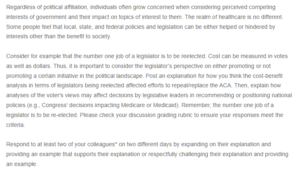Politics And The Patient Protection And Affordable Care Act
Undoubtedly, the calculus of cost-benefit analysis about lawmakers’ re-election prospects has significantly influenced endeavors aimed at repealing or replacing the Patient Protection and Affordable Care Act (ACA). During the 2016 election, Republican candidates campaigned on a platform centered around repealing the Affordable Care Act. These same lawmakers harbored concerns that their electorates would not support them if they failed to make a concerted effort to dismantle the ACA. Overall, the prevailing sentiment among voters was heterogeneous; certain individuals perceived it as an endeavor to alleviate a costly burden on society, whereas others regarded it as an effort to deprive the most vulnerable of crucial healthcare access (O’Rourke et al., 2017). Ultimately, it is plausible that the cost-benefit analysis about re-election exerted a more substantial influence on the decision to repeal the ACA, as opposed to the genuine convictions of the electorate.
The analyses of voters’ views can certainly affect legislative leaders’ decisions when recommending or positioning national policies. The current configuration of the legislative branch has been marked by a growing trend of partisan conduct, whereby elected representatives align themselves with either of two factions: those who endorse the Affordable Care Act and those who reject it. This partisanship often plays out in the decisions of the House and Senate when voting to pass national policies (Sacristán & Dilla, 2015). For example, the Senate Republican’s proposed health care bill of 2017, which would have been one of the most comprehensive pieces of legislation to repeal the ACA, found its fate in razor-thin margins of votes from the few Republicans in the Senate that would have been up for re-election in 2018 (Milstead & Short, 2019).
In essence, the calculus of weighing the costs and benefits of legislators’ re-election prospects significantly influences endeavors to revoke or replace the Affordable Care Act, as it shapes the determinations regarding whether to endorse a given legislative proposal. Similarly, the examination of the electorate’s disposition may influence the determinations of governmental officials regarding endorsing or opposing a particular federal agenda. Ultimately, it is the responsibility of the legislators to weigh both the cost-benefit analysis of their re-election and the sentiment of the people they represent, making sure that the policies passed best reflect the will of the people.
References
Milstead, J. A., & Short, N. M. (2019). Health policy and politics: A nurse’s guide (6th ed.). Burlington, MA: Jones & Bartlett Learning.
O’Rourke, N. C., Crawford, S. L., Morris, N. S., & Pulcini, J. (2017).Political efficacy and participation of nurse practitioners. Policy, Politics, and Nursing Practice, 18(3), 135–148. https://doi.org/10.1177/1527154417728514
Sacristán, J., & Dilla, T. D. (2015). No big data without small data: Learning healthcare systems begin and end with the individual patient. Journal of Evaluation in Clinical Practice, 21(6), 1014–1017. https://doi.org./10.1111/jep.12350
ORDER A PLAGIARISM-FREE PAPER HERE
We’ll write everything from scratch
Question 
Regardless of political affiliation, individuals often grow concerned when considering perceived competing interests of government and their impact on topics of interest to them. The realm of healthcare is no different. Some people feel that local, state, and federal policies and legislation can be either helped or hindered by interests other than the benefit to society.

Politics and the Patient Protection and Affordable Care Act
Consider for example that the number one job of a legislator is to be reelected. Cost can be measured in votes as well as dollars. Thus, it is important to consider the legislator’s perspective on either promoting or not promoting a certain initiative in the political landscape. Post an explanation for how you think the cost-benefit analysis in terms of legislators being reelected affected efforts to repeal/replace the ACA. Then, explain how analyses of the voter’s views may affect decisions by legislative leaders in recommending or positioning national policies (e.g., Congress’ decisions impacting Medicare or Medicaid). Remember, the number one job of a legislator is to be re-elected. Please check your discussion grading rubric to ensure your responses meet the criteria.
Respond to at least two of your colleagues* on two different days by expanding on their explanation and providing an example that supports their explanation or respectfully challenging their explanation and providing an example.